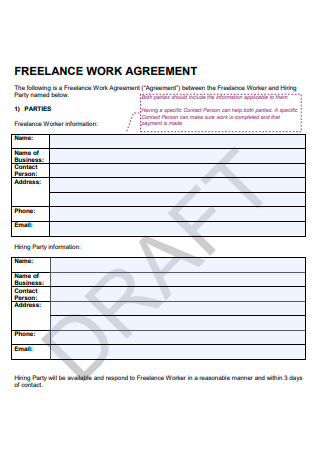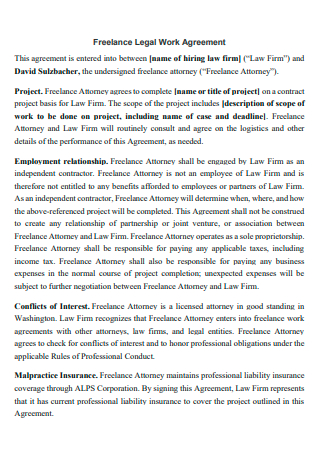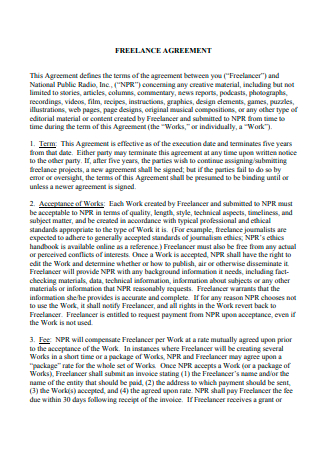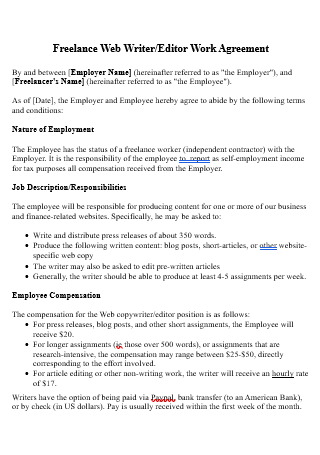3+ Sample Freelance Work Agreement
What Is a Freelance Work?
Freelancing is delivering services as an independent contractor. It comprises working under a contract that does not need daily office attendance at a particular hour. Freelancer is the phrase for individuals who engage in freelancing. Freelancers are considered self-employed and can work independently for many companies. In contrast to long-term employment, freelancers work for clients on demand, supplying goods and services as needed. According to the statistics, fifty-nine million Americans reported freelancing in 2020, or 36% of the total American employment.
Benefits of Being a Freelancer
In recent years, freelancing has become more prevalent, with more than a third of the population engaging in it. Additionally, people do not freelance out of necessity. The majority choose the freelancing lifestyle on purpose. When you consider the perks and independence of being your employer, this is not unexpected. If you’re considering beginning a freelance business as a side gig, part-time, or full-time job, you’ve arrived at the perfect place. Here, we examine the benefits of being a freelancer today—many people considering freelancing question whether or not it is a sensible decision. You may be considering freelancing to supplement your income or wonder if you can earn enough to quit your day job and coworkers for self-employment. If so, you would join the 36% of freelancers who have made it their full-time occupation. Although it may take a great deal of time and effort to get started, it is possible to become a successful freelancer. This lifestyle continues to attract an increasing number of individuals.
Tips To Achieve Freelance Success
Freelancing has been appealing for many years, but the COVID-19 pandemic has thrust it to the forefront. As the workforce becomes increasingly dispersed across industries, freelance labor has become the solution for many. We have created a list of seven ideas for the increasing number of independent professionals interested in boosting their customer lists. These tips will assist freelancers of all experience levels to build their careers and carve out a successful niche.
1. Define your expertise and the services you wish to provide.
When clients want to hire a professional, they want a freelancer who has worked in their industry before. Even though any freelance writer might be able to write about plumbing, one who has written a lot on the subject will have the background needed to write a better piece and is. Therefore, someone businesses want to hire for their marketing campaigns. Think about what kind of business you want to run on your own. Find out where you have done work before. Think about your skills and experiences and how they can help you in your freelance career. You can stand out as a professional if you have a background in or expertise in certain subjects, experience working with clients or companies in specific industries, or even certifications. If you want to work in a particular field but don’t have formal occasion or training, it can be helpful to look for credentials or learning experiences to add to your resume.
2. Adjust your prices to be competitive as needed.
When first starting, many freelancers may be tempted to undervalue their services because doing so will help them create a clientele. In reality, you should set competitive pricing based on your qualifications. Remember that clients want to engage with specialists they can trust to confidently and competently manage the project. Pricing yourself too low can undermine potential clients’ faith in your abilities. It can also set a common standard for your clients’ professional pricing. Instead, focus on your professional experience and industry expertise. Consider the types of similar work you’ve accomplished, the outcomes you’ve achieved, and the industry-standard rates. When bidding on tasks or reaching out to clients for business, you should be truthful about your pricing. Consider what others in your industry make per hour when deciding on an hourly wage. If you need to establish a rate for the entire job, determine how many hours it will likely take you, including time for revisions and client communication. Remember that as you progress through your freelance profession, your experience will continue to grow. Consequently, it would help if you altered your prices appropriately. As you expand your portfolio and demonstrate your expertise to clients, you can leverage your growing confidence in your abilities to change your costs and ensure that you are adequately compensated for your job.
3. Build your digital presence
So much of the modern world is conducted online. Employers publish job openings online, and clients search online for independent workers. Diverse internet platforms also make it simple to construct a portfolio showcasing your abilities and expertise for people seeking freelancers in your specialty. Professionals can establish personal sites that emphasize their previous work and allow clients to browse available professionals and locate those with the appropriate skills. You can develop a solid digital presence on numerous channels. In addition to creating a portfolio, you can promote your freelance business via social media. Developing a robust network can provide you with leads on potential clients and opportunities to showcase your professional knowledge.
4. Utilize online platforms to find clients.
With the rise of freelancing across enterprises, web-based platforms facilitate the connection between freelancers and clients. Clients who need freelancers are aware that they can register accounts on these platforms to locate the independent professionals they seek. This allows them to collect bids from several independent professionals in the appropriate area and evaluate their portfolios and samples of previous work. However, it is invaluable for freelancers to rapidly submit requests for multiple assignments from a single website and contact diverse clients seeking labor in their chosen fields. Professionals can expand their clientele and begin to enjoy the numerous advantages of the freelance lifestyle.
5. Use contracts to define obligations
When you win bids or are handed assignments by a new client, the contract you draft can clarify expectations and ensure the project runs as smoothly as possible. Communication is crucial to the happiness of both the freelancer and the client. Consider incorporating wording in the contract that specifies the exact expectations of both parties. For instance, if you’re a freelance writer, you should assess how many revisions you’re willing to perform before calculating your project rate. If the project is paid hourly, be careful to establish the criteria for time tracking and client reporting. Details, such as how the parties will coordinate and communicate, must also be recorded and agreed upon. Requests for email communication can be included in the contract if you dislike having your job disrupted by phone calls but are adept at responding to emails quickly. Other conditions, such as whether the work can be included in a portfolio, should also be defined. You can utilize a contract template to assist you in drafting an ideal contract. Before signing the final agreement, ensure that it meets the needs of both parties.
6. Update clients regularly
Once you begin a project, you should routinely inform your clients of your progress. Pay close attention to the parameters provided in your contract to determine whether and when they anticipate significant revisions. For instance, you may have stipulated in the assurance that you will notify them when you hit important milestones. Immediately inform them of any modifications to the project. Keep the lines of communication open if you need to change the deadline or if unforeseen events force you to reconsider what you had previously agreed to. Share the rationale behind the change and how you will help them manage it. After submitting the project, maintain an open dialogue on their satisfaction. You should take advantage of opportunities to expand your clientele and network as a freelance worker. You can display concern for the client’s experience if you know how effectively you met their expectations. This assists in establishing your brand and reputation.
7. Do not be hesitant to request referrals.
As you begin to collect delighted customers, make sure to ask for referrals when a project is complete. Inform your clients that you wish to establish a fantastic business and that you’re available if they know anyone seeking an independent professional to assist them with work. Since these referrals originate from clients who have proved their appreciation for your work, the recommendation will also carry greater weight. You can also solicit feedback from your clientele. These evaluations can be posted on your portfolio, personal business website, or even on social media platforms like LinkedIn. As with any small business, displaying your brand’s credibility will help attract the attention of those searching for comparable services.
How To Make a Freelance Work Agreement
Certain elements should be included in your freelance contract to increase its worth. Even if you already have a job contract, you may want to study the following list to ensure you don’t neglect any important conditions. This article is not a complete list of contract provisions that every freelancer should include. I am not an attorney, and this is not intended as legal counsel. I only provide a few features I employ with my clients; your mileage may vary. I have outlined five terms that freelancers should consider including in their contracts.
1. Description of services and work
Establishing a project scope inside the contract is essential for establishing work expectations throughout the project. Effective freelance contracts specify what you will do for the client and when you will do it. When listing the contract’s activities, the more exact and detailed you can be, the better. Without a work description, many freelancers encounter scope creep, which occurs when the quantity of work within a project expands without a corresponding increase in budget or remuneration.
2. Payment schedule
Once you have accomplished all of the activities outlined in the freelance contract’s description of work and services, you have completed a significant portion of the agreement. Nothing is worse than not receiving fast payment for work completed after a project. Therefore, including clear payment terms in your independent contractor agreement is crucial. This contract section may provide more information than your hourly or set project rate.
3. Licenses and ownership rights for the final product
Freelancers commonly include this provision to establish who owns the work. Since the customer is paying you to perform the job, they will typically require that the work contract offer them exclusive rights and ownership of all project deliverables. If ownership rights are transferred to the client, the client decides what to do with your work. Alternatively, if you maintain ownership of specific components of the job, such as custom-developed software, you will need to specify the client’s rights and usage terms. The standards for ownership rights and licenses of the final output can vary by type of labor and industry. For instance, freelance photographers may be more inclined to grant a claim for an image, whereas freelance writers typically relinquish the entire copyright to the customer. This clause could potentially address the project’s inclusion in your portfolio. Before having any client work in your portfolio, you must obtain permission, and establishing approval at the outset of a project helps facilitate this conversation. Copyright law is intricate and detailed. Consult a lawyer to draft your copyright clause and check the entirety of your contract.
4. Terms and termination
Including a termination clause or right to close establishes a procedure for completing the freelance contract if the connection is not working. Throughout the contract, either party may determine that things aren’t working out due to poor communication, missing deadlines, or other issues. In this section, you can specify the grounds for early termination and the costs or penalties connected with doing so. Freelancers consider this area essential even if you have a clear deadline and contract end date. It becomes even more critical for ongoing work because it allows both parties to plan for the loss of income/work product upon contract termination.
5. Competitive engagements
As a freelancer, you must inform clients that your services are exclusive. Your client may not want you to work with them if you also assist their competitors. In contrast, your expertise in dealing with clients in the same business but in a different geographic service region could be advantageous. It would be advisable to clarify your policy for working with clients whose services or business sectors may overlap. A non-solicitation clause or a non-compete clause could extend the restrictions on your work with other companies. Consult an attorney to assess if agreeing to such a condition is in your and your company’s best interests.
FAQs
Is freelance work simple?
Freelancing is not a way to make a good living. It has some good points, but it also has some bad points. Some people can do well with them, while others can’t. How hard you find freelancing may depend on who you are, how you work, and how well you deal with uncertainty.
Is freelancing a good job?
There has been a change in the freelance market since most new businesses and startups hire freelancers to meet their needs. It shouldn’t be a surprise that many young people want to work in this field today.
Is freelance good for students?
Freelancing is an acceptable way to earn funds in college because you can do the work when you have time and get paid well. By now, you’re probably wondering what jobs you could do on your own and how much money you could make.
While all sides to a transaction typically anticipate a good ending, a robust contract outlining the terms of your agreement with your client is one of the most excellent methods to safeguard your business in a dispute. A freelance work agreement is vital to the development and operation of your firm. Without it, you risk losing the confidence and company of your clientele.




